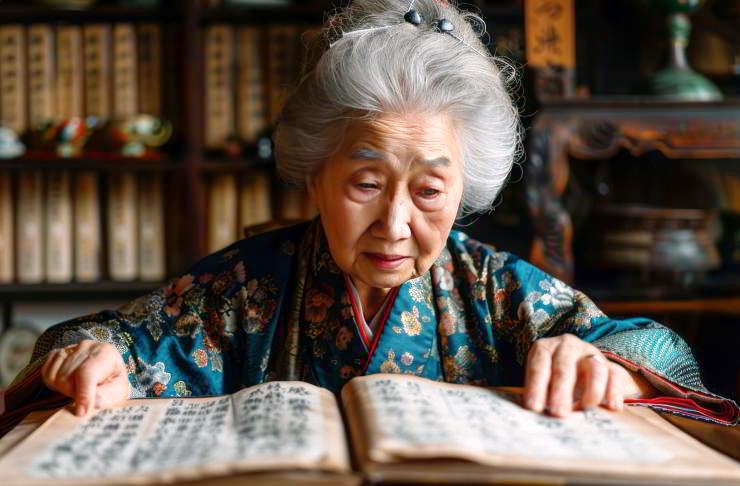A Wise Grandmother.

Like the other farmers, Taro also grew rice, wheat, and vegetables, living in peace and contentment. However, things
never remain the same.
One time, there was no rainfall, and the drought-like conditions parched the fields and dried the wells. Gradually, food became very scarce, and they feared the day when there would be no food at all.
The headman of the village had to take notice of the impending crisis. “We must think of some ways to resolve this problem,” announced the headman at the assembly of the villagers he had called. “Each person must have some food,” voiced one farmer, “but nothing can
grow without water.”
“I know. Now the only solution is to migrate to the adjoining mountainside. Let the young people remain here as they are strong and can work hard to improve the situation,” said the headman. After a moment’s silence, he continued, “All those over sixty should leave and go to the mountain village, where it will be easier to procure food.”
All the families bade a sad farewell to their loved ones with whom they parted and journeyed on. But not Taro, who could not bear the agony of parting due to his intense emotional attachment. He quietly
guided his grandmother to a dark recess at the back of the courtyard where she lived.
Silently, he supplied her with food and attended to all her needs. However, troubles seemed to follow each other. A few weeks later, the village headman had to post a notice that was important for
everyone to read.
It was from the warlord of the neighbouring town, who threatened to take half the land if the villagers failed to answer the three riddles sent by him. But if they answered the riddles correctly, he promised to provide the villagers with all the food they needed.
Taro quickly ran home to tell his grandmother about the riddles. In case she could solve them, as he hoped, the village headman might allow his grandmother to remain in the village. “Grandmother, listen, please listen carefully. Can you tell which part of the log is close to the top and which part is closer to the root?”
The old lady closed her eyes to think for a while and then said to Taro, “Float the log on water. The part closer to the root will sink, but the part closer to the top will remain afloat.” Taro beamed with happiness. Feeling certain that the answer was correct, he asked the second riddle. “How can you make a rope of ashes, Grandma?”
Her forehead creased as she closed her eyes to think hard. She opened her eyes. “Take a strong rope. Pour salt all over the rope. Light one end of the rope; it will burn slowly inch by inch, and what is left at the end is the coil of ashes.”
“Wow, that is great. You are a superb grandmother! So, now can I ask the third riddle?” “Go ahead. Let me see if I can answer.” “Well, well, this is the last one, Grandma. How can you pass the silk thread through a hollow pipe that is crooked and curved?”
The grandmother gave a hearty laugh. “That is easy. Take the thread, tie the leg of an ant to it, put some honey at one end of the pipe, and push the ant from the other end. The ant is sure to crawl through for
the sake of the honey at the other end, however crooked or curved
the pipe may be.
“How wonderful is my grandmother!” Taro was thrilled. He jumped and clapped with joy. “I am lucky to have such a wise grandmother,” and with these words, he rushed to the village headman. He told the headman all the answers, which he acknowledged were correct.
The headman was amazed to see the wisdom of such a young boy in his village. “Oh, no Sir, it was not me who answered,” said Taro humbly, bowing his head, “It was my grandmother who answered all of them.” The headman felt remorse and shame for having deemed all the old people useless. He thanked Taro and showered him and his grandmother with gifts, whose wisdom had saved the village.
Next, he ordered all the old people to be brought back to the village with all due respect, where they lived comfortably and happily. It rained, and all the wells filled. The land prospered again, thanks to Taro’s grandmother.
Folktale from Japan



